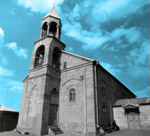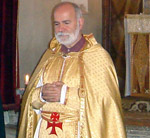Armenian Catholic Parish Without A Priest
 Sukhlis faithful demand Vatican sends an Armenian The Armenian village of Sukhlis, just 4 kilometers distant from Akhaltskha, has gone without a priest for the past four months. The local Saint Astvatzatzin Church remains silent. Father Grigor Mikayelyan, a celibate priest of the Mekhitarist Order of the Armenian Catholic Church, used to administer to the spiritual needs of Sukhlis and the nearby community of Mokhreb before being summoned back to Venice by his superiors.
Sukhlis faithful demand Vatican sends an Armenian The Armenian village of Sukhlis, just 4 kilometers distant from Akhaltskha, has gone without a priest for the past four months. The local Saint Astvatzatzin Church remains silent. Father Grigor Mikayelyan, a celibate priest of the Mekhitarist Order of the Armenian Catholic Church, used to administer to the spiritual needs of Sukhlis and the nearby community of Mokhreb before being summoned back to Venice by his superiors.
His planned replacement is Father Anatoly, a Ukrainian. Local Armenians from Sukhlis and Mokhreb have started a petition drive to demand the return of Father Grigor. Residents clash with non-Armenian clergy Armenians residents have always encountered problems with non-Armenian Catholic priests serving in Sukhlis. Mostly non-Armenian clergy have served in the Catholic rite St. Astvatzatzin Church, built in 1892-1900.
From 1980-1994 Iosif Kornashevky, a Latvian celibate priest, was the pastor at St. Astvatzatzin. He was succeeded by a Syrian, Father Emmanuel, who served till 2003. He in turn was replaced by Father Anatoly, who served till 2006. In their petition, Sukhlis residents write, “Father Anatoly would come to the church at his pleasure, but the result was that the number of congregants gradually decreased.”
Mkrtich Bakhchinyan, a member of the church parish council, says that starting with Father Kornashevsky and including Nerses who was sent recently for a trial run, all the clergy have served with one purpose in mind – to amass as much money as possible and thus garner the favor of Rome. Mr. Bakhchinyan, says that Bishop Nishan Karakehyan former Catholic Church Primate for the Eparchy of Armenia, Georgia and Eastern Europe, and the priests serving in the village, exhibited anti-Armenian tendencies which included insulting local residents for their strongly held Armenian identity.
In 2006, the president of the village council, the parish council and the school principal, petitioned high ranking Catholic clergy in Armenia, Georgia and Italy. In their communiqué, local residents said that they had lost all confidence in Diocesan Primate Nishan due to the slander and machinations that has taken place that year. They wrote that due to a decree issued by Bishop Nishan, no church services had been held for the past five months, including confessions, marriages and funeral rites.
Father Grigor a gifted, humble man  Mr. Bakhchinyan says that Father Grigor was a gifted and pious clergyman, dedicated to serving the Armenian nation and the church. The parish council president says that Father Grigor only took the bare minimum needed to survive from the church coffers.
Mr. Bakhchinyan says that Father Grigor was a gifted and pious clergyman, dedicated to serving the Armenian nation and the church. The parish council president says that Father Grigor only took the bare minimum needed to survive from the church coffers.
“It was due to the efforts of Father Grigor that the village kindergarten was built. He got the irrigation system back up and running and assisted in the construction of the new village school,” says Mr. Bakhchinyan. During the tenure of Father Grigor, more people started to attend church services. Their numbers rose to the level where evening services were started to accommodate the faithful after returning from work. Despite being a Catholic, Father Grigor, also cooperated with the Armenian Apostolic Church on a host of national projects, including joint annual Genocide commemorations.
To underline the difference between Father Grigor, an Armenian, and non-Armenian Catholic priests, a Sukhlis resident recounts the following incident. Father Anatoly, a Pole, who now serves as the priest in the village of Tzghaltbila, one day came to our village to officiate at a wedding. During the service he asked the newlyweds if indeed the Turks had committed genocide against the Armenians or was it the other way round. Naturally, the couple responded that the Turks had massacred Armenians. But Father Anatoly contradicted them, claiming that the Armenians had actually committed genocide against the Turks. Village residents believe that the activities of Father Grigor to preserve Armenian cultural identity didn’t meet with the favor of the Vatican and that, over the course of four years of hounding him, church superiors made sure he was “neutralized”. “We regard this as unacceptable and aberrant and call upon Armenians worldwide to support our efforts to get Father Grigor back,” the Sukhlis petition states.
Mekhitarists have a shortage of priests A majority of the ancestors of present-day Sukhlis residents emigrated from the village of Houndzk, in the province of Erzurum, during the Russo-Turkish war years 1828-1830. They were guided out by a certain Archbishop Garabed and established a new community across the border, naming it Souflis (today’s Sukhlis). It is said that Abbot Mekhitar of Sebastia, founder of the Mekhitarist Congregation, did pastoral work in the Houndzk area. Priests of the Mekhitarist Order have also served in Sukhlis in the past. Residents say that if Father Grigor cannot be sent back, they are hoping that another Mekhitarist clergyman can be appointed. Father Vahan Ohanyan, who was appointed “Apostolic Administrator” of the Armenian Catholics of Armenia and Eastern Europe in January 2010 to succeed Msgr.
Nishan Karakeheyan, told Hetq that Father Grigor had actually been sent to Akhalkalak to recruit aspiring pupils and that he hadn’t been granted permission to perform parish duties. However, after local residents requested that he remain, Father Grigor did so. (It appears that His Excellency Mgr. Nishan Karakeheyan has been appointed Armenian Catholic Bishop Apostolic Visitor for Europe after leaving) This caused some conflict with Bishop Nishan, who regarded the decision of Father Grigor to stay on in Sukhlis as a sign of impertinence. Many thus infer that Bishop Nishan called him back to the Mekhitarist Congregation as punishment. Father Vahan says that Bishop Nishan was within his rights to call Father Grigor back.
However, he adds that, “If we wish to protect Armenian interests, what Father Grigor did was good and appropriate.” He says he has received the petition of the residents of Sukhlis, but that unfortunately, due to the shortage of clergy, he cannot appoint a permanent priest for the community. Presently, there are two clergy for the entire Samtskhe-Javakhk diocese – Father Anton serves the village of Heshtia and Father Boghos is in Tzinouban. However, residents of Sukhlis are against having Father Boghos as their pastor again.
They weren’t satisfied with his work in the past. “If I had priests, I would certainly send an Armenian clergyman to the village,” assures Father Vahan, noting that he is aware of the disagreements that have plagued relations between locals and non-Armenian clergy and the respect in which Father Grigor is held in Sukhlis. Father Vahan promises to pass on the petition to his superiors at the Vatican. “Sadly, I cannot go against the wishes of the church authorities,” he confesses.
 Videos
Videos Photos
Photos




Write a comment